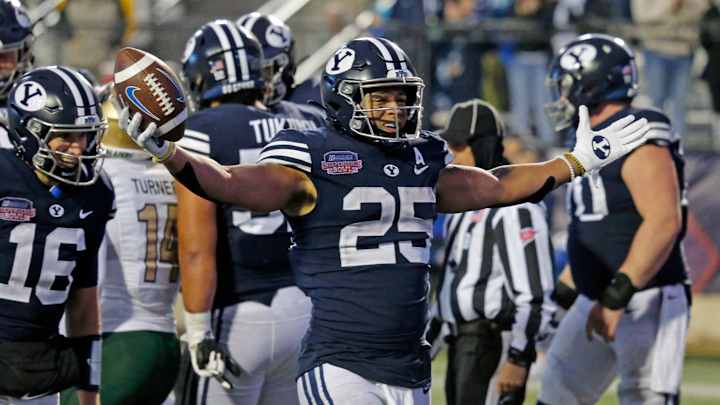66 Days Until Kansas Football: Big 12 Expansion Primer – BYU

The third university going to the Big 12 in 2023 is a current independent (in football, at least), religion-affiliated school with a national reach and a national championship to its name. No, it’s not Notre Dame. It’s Brigham Young University.
Get to know the western, blue-sported Cougars of BYU. And if you missed it, go back and read our primers on Houston and Cincinnati.
University Overview
Location: Provo, Utah
School type: Private
Year founded: 1875
Undergrad enrollment: 33,365
Football History
BYU has a rich football history that goes back 97 years and includes a national championship (1984), a Heisman winner (Ty Detmer in 1990), and an overall record of 603-431-26. The Cougars have also won 23 conference championships—despite being independent since 2010—and have made 39 bowl games, winning 16.
The 1984 title team was BYU’s only undefeated season, going 13-0 after starting the season knocking off No. 3 Pittsburgh and then defeating Michigan in the Holiday Bowl. But the Cougars have had plenty of great years. BYU lost just once six times, most recently in 2020 when its only loss was to 11-1 Coastal Carolina that finished 14th in the AP poll. One of those other one-loss teams was the year before the undefeated title, when the 83 Cougars went 11-1 and were led by a quarterback named Steve Young.
Young is one of 156 BYU players that have played professionally and 153 that were drafted.
Football in 2022
The Cougars are coming off a 10-3 season in 2021 in Kalani Sitake’s sixth year at the helm. The season ended with a 31-28 loss to UAB in the Independence Bowl, but BYU still finished No. 19 in the final AP poll. Like Houston, BYU’s offense was one of the nation’s most dominant, scoring 33.1 points per game, good for 29th best.
Quarterback Jaren Hall is back for another year to build on his 2,500-yard, 20-TD, and five-interception campaign. But the loss comes in the backfield without Tyler Allgeier, who racked up 2,899 yards and 36 touchdowns in his career before being drafted by the Atlanta Falcons. But Hall will have four of his five starting linemen back and two of his top receivers from 2021. But it’s defense where BYU will be dangerous. The Cougars have 11 starters back and 90 percent of its production from last year, equating to 208 combined starts.
All of this is to say that BYU should be highly competitive in its final year as an independent.
Why they were chosen
The football pedigree is there, even if it hadn’t been at a traditional power league. But the Big 12 was not going to get those players. Most of the power-five moves have been made. And BYU has also proven to be competitive—though not to the level of football—in basketball and other sports as well.
This is also, by nature of its religious affiliation, a national brand. It is not to the level of Notre Dame, but along with a living alumni base of nearly 500,000 spread out across the country—including nearly 20,000 in Texas—BYU also has a wide audience of those connected to the Church of Latter-day Saints that root for its teams. So while BYU spreads the conference’s footprint west, it’s less about tapping into a single market or region (like Houston or Cincinnati) and instead growing eyeballs around the US.
The conference has to work around the no-Sunday-activities policy, but the benefits outweigh the conflicts there.
Join the discussion! Come talk about this or any of our articles on the Blue Wing Rising Discord Server.
Follow Blue Wings Rising on Twitter.
Listen to the official podcast of Blue Wings Rising: The Rock Chalk Podcast.
